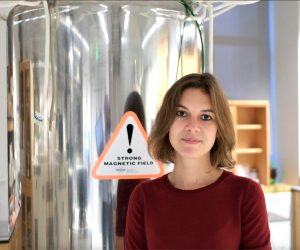Ahmet Kusoglu
Chemist Staff Scientist/Engineer
Lawrence Berkeley National Laboratory, U.S.
Date: March 23, 2022
Time: 1300h ET
Sponsors: Hiden Analytical, Element Six, TA Instruments – Waters
Ahmet Kusoglu
Chemist Staff Scientist/Engineer
Lawrence Berkeley National Laboratory, U.S.
Date: March 23, 2022
Time: 1300h ET
Sponsors: Hiden Analytical, Element Six, TA Instruments – Waters
 Join The Electrochemical Society (ECS) and IOP Publishing for the “Diversity in Publishing Science” webinar, a deep dive into empowering global researchers and accelerating scientific discovery by making diversity, equity, and inclusion (DEI) central to publishing science. Jessica MacDonald moderates the discussion with panelists Dr. Christina Bock; Kim Eggleton; and Adrian T. Plummer MPA, PMP.
Join The Electrochemical Society (ECS) and IOP Publishing for the “Diversity in Publishing Science” webinar, a deep dive into empowering global researchers and accelerating scientific discovery by making diversity, equity, and inclusion (DEI) central to publishing science. Jessica MacDonald moderates the discussion with panelists Dr. Christina Bock; Kim Eggleton; and Adrian T. Plummer MPA, PMP.
Date: March 30, 2022
Time: 1000-1100h ET
Cost: Free to register!
Format: Zoom Webinar
Pre-registration: Required through ECS My Account
Don’t have one? It’s easy to create—visit Create an Account now. (more…)
Bryan Pivovar
Senior Research Fellow and Electrochemical Engineering and Materials Chemistry Group Manager
Chemistry and Nanosciences Center
National Renewable Energy Laboratory, U.S.
Date: February 23, 2022
Time: 1000h ET
Sponsors: Hiden Analytical, Scribner Associates, Gamry Instruments
Zhichuan (Jason) Xu, PhD, FRSC
Professor
School of Materials Science and Engineering
Nanyang Technological University, Singapore
Date: December 15, 2021
Time: 1000h ET
Sponsor: Hiden Analytical
 The Electrochemical Society hosted Prof. Raphaële J. Clément’s live online webinar, “From order to disorder: NMR insights into ionic conduction in battery materials,” on October 27, 2021. Below are answers to questions posed during the presentation.
The Electrochemical Society hosted Prof. Raphaële J. Clément’s live online webinar, “From order to disorder: NMR insights into ionic conduction in battery materials,” on October 27, 2021. Below are answers to questions posed during the presentation.
Raphaële Clément is an Assistant Professor in the Materials Department at the University of California, Santa Barbara (UCSB), U.S. She received her PhD in Chemistry in 2016 from the University of Cambridge, UK, working under the supervision of Prof. Clare Grey. Her doctoral work focused on the study of layered sodium transition metal oxide cathodes for Na-ion secondary batteries. She then joined Prof. Gerbrand Ceder’s group at the University of California, Berkeley (UC Berkeley), U.S., focusing on cation-disordered rock salt oxyfluorides for Li-ion battery applications. She joined the UCSB faculty in 2018. Her primary research focus is the development and implementation of magnetic resonance techniques (experimental and computational) for the study of battery materials and beyond, with a strong emphasis on operando tools. She is an Associate Editor for Battery Energy, a new open access journal by Wiley. (more…)
Prof. Jennifer L. M. Rupp FRSC
Technische Universität München (TUM), Germany
CTO, TUM International Energy
Thomas Lord Associate Professor of Materials Science and Engineering
Associate Professor of Electrical Engineering and Computer Science
Massachusetts Institute of Technology
Date: December 1, 2021
Time: 1300h ET
Sponsors: Hiden Analytical, Royal Society of Chemistry, Instron, Metrohm
Michael H. Hecht delivered the ECS Lecture, Electrolysis on Mars: MOXIE and the Perseverance Mission, at the Plenary Session of the 240th ECS Meeting on October 11, 2021. Answers to questions posed during his lecture follow.
Michael Hecht is the Associate Director for Research Management at the Massachusetts Institute of Technology (MIT) Haystack Observatory. Since 2013, he has been Principal Investigator for the Mars Oxygen In-Situ Resource Utilization Experiment (MOXIE) instrument on NASA’s Mars 2020 Rover (Perseverance) mission, a technology demonstrator to validate the instrumentation and methodology to produce large quantities of oxygen from the Martian carbon dioxide atmosphere using solid oxide electrolysis (SOXE). From September 2019 to August 2020, Professor Hecht served as Deputy Project Director for the Event Horizon Telescope, the consortium that in 2019 delivered the first image of a black hole. His diverse experiences span planetary missions, observational astrophysics, space instrument and SmallSat development, planetary science, and project, program, and line management. Prior to joining MIT, he worked for 30 years at the NASA Jet Propulsion Laboratory (JPL), developing instrumentation for planetary missions. There he achieved the designation of Senior Research Scientist. At JPL, he served as Principal Investigator and Instrument Manager for the MECA (Microscopy, Electrochemistry, and Conductivity Analyzer) instrument on the Phoenix Mars mission. MECA operated through the summer of 2009, with major findings in microscopy, the physical chemistry of water in soil, and notably, in aqueous soil chemistry using electrochemical methods.
Prof. Hecht received his PhD in Applied Physics at Stanford University in 1982 after completing his BA in Physics at Princeton University and MS at MIT. His research has garnered numerous awards including the 2020 Breakthrough Prize in Fundamental Physics and 1990 Lew Allen Award for Excellence. His h-index is 51 with over 11,500 citations. (more…)
Prof. Jillian L. Dempsey
Associate Professor
University of North Carolina at Chapel Hill, U.S.
Date: November 17, 2021
Time: 1300h ET
Sponsors: Hiden Analytical, Royal Society of Chemistry
The conversion of energy-poor feedstocks like water and carbon dioxide into energy-rich fuels involves multi-electron, multi-proton transformations. In order to develop catalysts that can mediate fuel production with optimum energy efficiency, this complex proton-electron reactivity must be carefully considered. Using a combination of electrochemical methods and time-resolved spectroscopy reveals new details of how molecular catalysts mediate the reduction of protons to dihydrogen and the experimental parameters that dictate catalyst kinetics and mechanism. These studies create opportunities to promote, control, and modulate the proton-coupled electron transfer reaction pathways of catalysts.
Learn about:
Raphaële J. Clément
Professor
Materials Department
University of California, Santa Barbara, U.S.
Date: October 27, 2021
Time: 1300h ET
Sponsors: Hiden Analytical, Royal Society of Chemistry, American Chemical Society Materials Letters, JEOL USA, Inc.
The development of next-generation solid state ion conductors hinges on an understanding of microscopic diffusion mechanisms and the identification of roadblocks along macroscopic diffusion pathways (e.g., intragrain defects and grain boundaries). (more…)